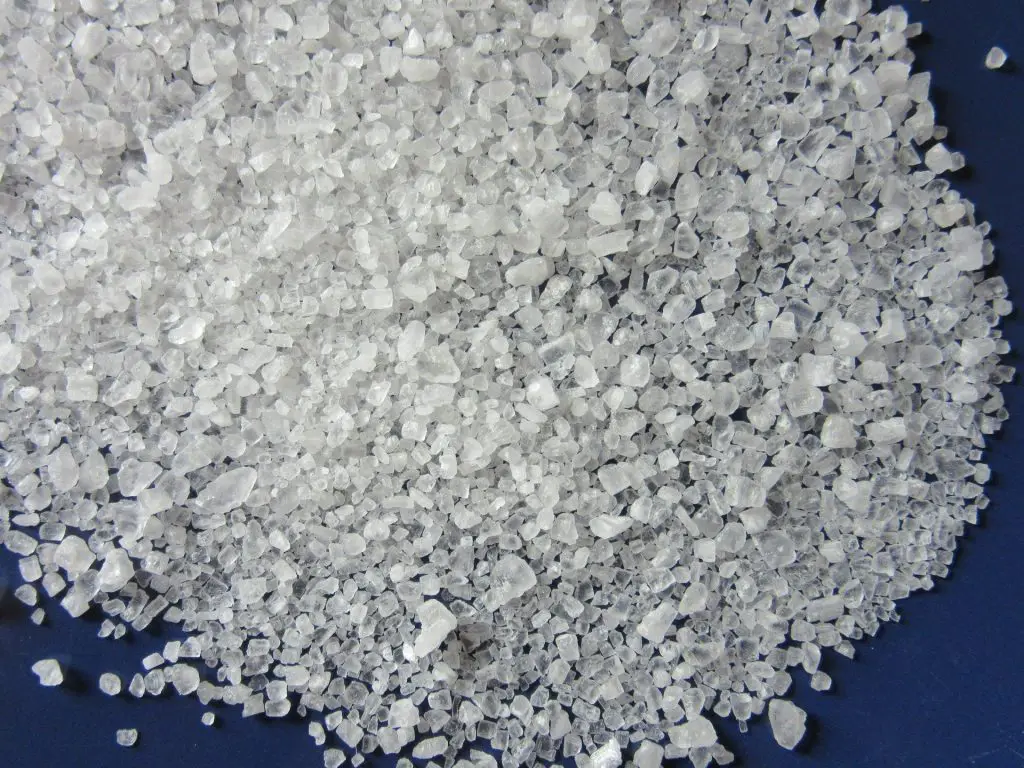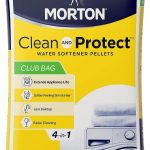Water Softener salt is detrimental for your health. It cannot kill you in the long run. But it can cause severe side effects in your body once you eat it. Water Softener salt is sodium chloride and it exists as a non processed salt in raw form. Eating this type of salt and ingesting it is neither safe nor advisable.
In the long run, it can have severe consequences including elevated heart rate which are the side effects of excess sodium. Sodium can affect other body parts as well including your kidneys and liver etc.

Can you Eat Water Softener Salt?
Softened salt is not edible at all considering softener salt is more coarse, broad, hard, and difficult to melt. It is unprocessed to start with which itself waves a red flag. Anything unprocessed does not have the essential minerals that help in ingestion of that food item. First symptom that happens after consuming softener salt is bad stomach.
Ingesting water softener salt in very small quantities won’t make a person land up in an ICU bed of a hospital. But in the long run, the water softener salt can cause health to deteriorate and if someone mistakenly consumes it in larger quantities they should be assisted to a nearby poison control center.
Are Water Softener and Regular Salt the Same or Different?
Water softener salts and regular salts are very different from each other. Simply put, the only thing similar is that both are termed as salts. Softener salts act as an agent that helps in extracting dissolved dirt in water, it is there in the brine tank of your softener. It often exists without being processed. Even in the softening process, softener salts help in adding sodium and extract dirt.
Regular salt is a processed salt with very small granules. They cannot extract dirt out of water. They at best will be dissolved completely. They are processed with iodine which helps the Human Body to fight Goiter which is a rare disease developed because of the body’s inability to access iodine.
Can Water Softener Salt Be Used for Cooking?
Water Softener Salt cannot be used for cooking as the melting point of softener salt is very high. It cannot melt properly in your food. Following are few reasons why water softener salt cannot be used for cooking:
- The crystals of untreated salt/rock salt used for water softening are big. It is impossible to melt it, hence it’s unsuitable for cooking.
- Water Softener salts cannot be used for canning and packaging of meat, as it is untreated and hence might contain harmful minerals. While ingesting meats packed with softener salts can have a chance of ingesting harmful minerals.
- Water Softener salts are simply too hard to metabolise, even if you manage to melt them through intense cooking, your body will have a hard time digesting it. This would mean you will have an upset stomach.
Can You Use Water Softening Salt in an Ice-cream Freezer?
Water softener salt inhibits and hinders melting point. Softener salts on a longer run can keep your ice cream freezer being clogged with excess ice. It can slow down the freezing temperature of the ice cream freezer.
It’s good for people who struggle with a lot of ice cleaning and have a freezer filled with hard sheets of ice. It is not helpful in making ice creams. It can work if you want your ice cream to be served later and also melt ice. But ideally, these melting and freezing acts with application of softening salt do not go hand in hand.
Is Water Softener Salt Poisonous?
Water Softener Salt is not poisonous. It can have bad health effects in the long run. The first side effect that a person instantly experiences is an upset stomach. Then it can lead to other major health problems that can affect the heart, kidneys and liver. Sodium in excess form which essentially is a party to softener salt in chemical form alters heart rhythms and affects kidneys. When it alters digestion it can mess with your metabolism which happens in the liver.
Is Water Softener Salt the Same as Rock Salt?
Rock salt is a pure form of salt and is dug in cold mines. It’s very hard in texture and has calcium sulphate. It is not easily soluble in any liquid form. Rock Salt is a type of water softener salt that is used for softening water. But, Rock Salt is not that effective as a water softening salt considering that it is not soluble. It is hard and can have a lot of impurities.
The best alternative type of Softener Salt that shall be used is Block Salt which is safe and 100% soluble in water. Block Salt and Potassium Chloride salts are more preferred over other water softening salts like Rock Salt, Solar Salt, and Evaporated Salt. All the hard salts are insoluble. It has many sediments and hard minerals which can result into buildup requiring more maintenance.
Factors Determining the Use of Water Softening Salt
Water Softening Salts are the first in the phase of treating hard water. Many factors determine on choosing the right type of salt. Some factors such as water solubility and frequency of use matters.
Water Softener Salt vs Table Salt
| Water Softener Salt | Table Salt |
|
|
|
|
|
|
|
|
|
|
FAQs on Right Choice of Water Softener Salts
Why is Selecting the Right Kind of Salt Important?
Selecting the right salt equates quite similarly to the usability lifespan of your softener. For instance, some Water Softener Salts are a clear no when it comes to using them for softening purposes. Pellet salt is one such salt. Pellet salts have a sticky adhesive and they stick inside forming cakes and destroying the interiors of the softener’s hardware. The professional advice always says to use Crystal salt. Crystal salt can be a little impure, but in the long term, they are better.
Is Water Softener Salt Safe for Pets?
Pets should not consume water softener salts. These hard salts have excess sodium which will make your pet fat. In the long run, these salts are not good for your pets. Dogs for instance can easily digest the impurities which includes dirt and essential minerals, the problem is with the Sodium Chloride that is part of these softener salts. Sodium Chloride for the most part is sodium. Sodium can cause inflammation, elevated fat percentage and bone deterioration in dogs if fed for a longer time period.
What will Happen If You Eat the Water Softener Salt?
After consuming softener salt one can have some side effects initially. It starts with an upset stomach. There is no specific data specifically to back anything more than that. However, if the salt has bad mineral compounds which are natural impurities of a salt. It can cause other health problems. This can be anything from a bacterial disease to a flu. In case you see such symptoms happening to you, it is advisable to not be late and visit a Doctor.
Final Say on Consuming Water Softener Salts
Softener Salts are not at all edible nor in the short run or long run. Regular Salt is very different from Softener Salts. Regular Salt is processed whereas Softener Salt is unprocessed for the most part. In softener salts it is advised to use Block Salt and Crystal Salt as opposed to Rock Salt. Softener Salts are not as deadly as they can lead you to an appointment at Poison Control. But it can cause health deterioration in the long run and upset stomach as a direct symptom after taking it.












Add Comment